Three-day International Conference
on
“Worldview of Development: Challenges and Alternative Paradigm”
March 9-11, 2012
Hotel Aurora Towers/ Poona College, Pune
Organised by
Institute of Objective Studies
AKI’S, Poona College of Arts, Science & Commerce, Pune
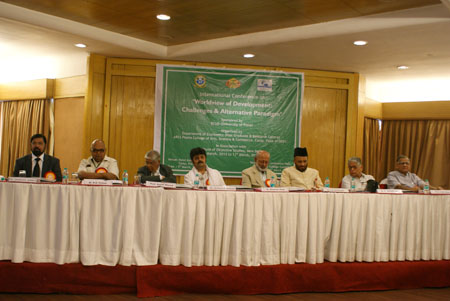
L-R: Dr. Shakeel Ahmed, Head Dept. of Economics & Vice –Principal, Poona College, Pune; Dr. K. G. Pathan, Senior Advisor-Education Sector, Alliance for US India Business, Pune Chapter; Dr. Ausaf Ahmed, Former Head, Special Assignment, IDB, Jeddah; Dr. Shrikant Barhate, Consultant Urban Development and Human Resource, World Bank; Dr. M. Manzoor Alam, Chairman, Institute of Objective Studies, New Delhi; Dr. G. M. Nazeruddin, Principal, Poona College, Pune; Mr. S.P. Shukla, Former Finance & Commerce Secretary, Govt. of India; Prof. Z. M. Khan, Secretary General, Institute of Objective Studies
3-Day IOS Seminar at Pune
Pune, March 9: A three-day international conference “Worldview of Development: Challenges and Alternative Paradigm” began here today at Aurora Towers. The conference was organised jointly by the Institute of Objective Studies (IOS) and Department of Economics of Akl’s Poona College.
The programme began with a recitation from the holy Quran by M. Musharraf Hussain.
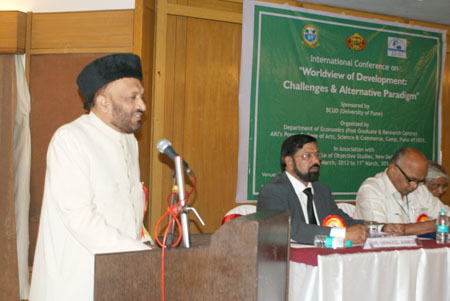
Speaker: Dr. G. M. Nazeruddin, Principal, Poona College, Pune
In his welcome address, the principal Dr G.M. Nazeruddin introduced the Poona College of Arts, Science and Commerce, which began in 1970 with only 28 students. Today it has 6,000 students and the college now has PG courses and advanced research centres.
The IOS General Secretary, Prof. Z.M. Khan, introduced the IOS and its Silver Jubilee Programme. “Twenty five years is a short time in the history of institutions and nations, but substantial in terms of a “individual” life span, he observed. He asked the audience to visit the IOS website (iosworld.org) to know more about the institution, its vision and its 25 years of research and advocacy.
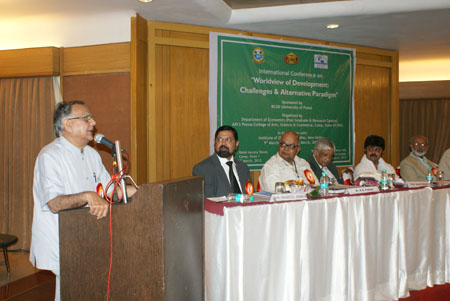
Speaker: Prof. Z. M. Khan, Secretary General, Institute of Objective Studies, New Delhi
He said today’s young men and women would be running the world tomorrow. He invited the younger generation to get involved with the IOS movement. Prof. Khan invited students to avail of IOS scholarship for postgraduate, M Phil and PhD students.
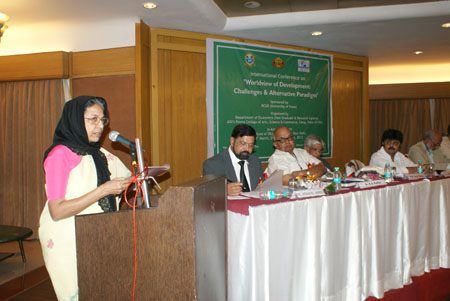
Speaker: Dr. Malika B. Mistry, Demographer, Social Activist and Community Worker
Dr Malika B. Mistry of the Poona College introduced the theme.
Former head of Special Assignments, Islamic Development Bank, Jeddah, Dr Ausaf Ahmad, thanked everyone for giving his inaugural address a patient hearing even before he began it.
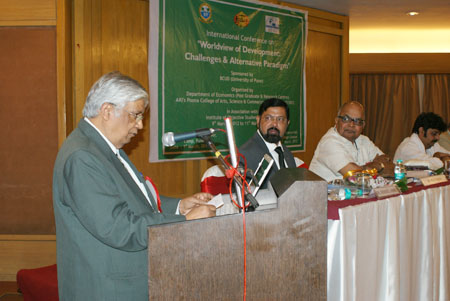
Speaker: Dr. Ausaf Ahmed, Former Head, Special Assignment, IDB, Jeddah
His theme was Islamic perspective on economic development. Dr Ahmad said the Islamic view of development emphasised human welfare rather then profits and capital accumulation.
The Guest of Honour, Dr KG Pathan, Senior Advisor, Education Sector, Alliance for US-India Business, said in his address that the way human greed was growing had put nature in serious jeopardy. “Curb your desires to conserve nature,” he counselled the audience.
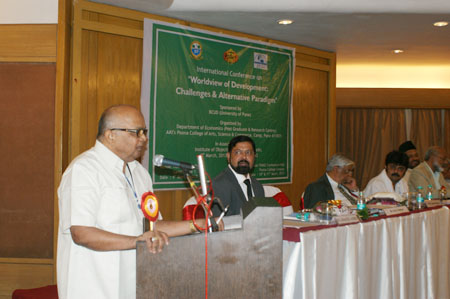
Speaker: Dr. K. G. Pathan, Senior Advisor-Education Sector, Alliance for US India Business
Dr. Pathan emphasised the significance of religious values in guiding the course of development and giving it a human face.
In his keynote address, Dr Shrikant K. Barhata, Consultant Urban Development and Human Resource, World Bank, quoted historian Arnold Toynbee, “Civilisation is a voyage, not a harbour”, to make the point that civilisation is a work in progress.
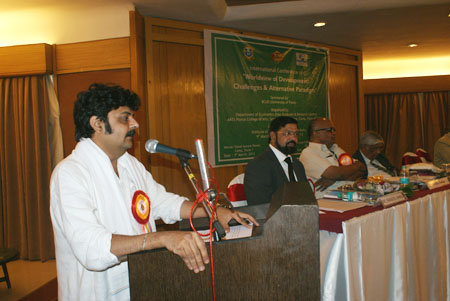
Speaker: Dr. Shrikant K. Barhata, Consultant Urban Development and Human Resource, World Bank
Development, he pointed out, was a multi-disciplinary activity that was constantly evolving and new approaches and methodologies were being employed in the pursuit.
The pursuit of development today has evolved “from indefinite, incoherent uniformity to definite, coherent heterogeneity,” he observed.
Dr SP Shukla, formerly of the Indian Administrative Service, observed that a new paradigm was needed only when the old one was in a crisis. “In terms of development, we are facing three contradictions: (1) north-south contradiction, (2) growing prosperity and (3) growing disparity/environment conundrum.
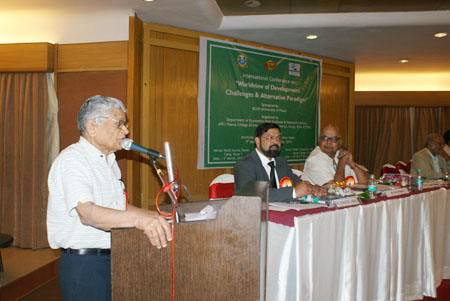
Speaker: Mr. S.P. Shukla, Former Finance & Commerce Secretary, Govt. of India
He talked about the growing disparity between the developed north (Europe and North America) and the south (Asia and Africa) as well as the Western aggression against West Asia, the decimation of peasantry and shrinking of democratic space everywhere.
“Development has to begin by resolving these crises”, he declared. Today, development was depleting environment and producing inequality. “Development must resolve these issues. That will be the alternative paradigm,” he concluded.
The IOS chairman, Dr Mohammad Manzoor Alam said in his presidential address that under the Silver Jubilee Programme 14 such seminars and conferences had been planned to be held in different cities of India. The current conference at Pune was 13th, the last would be held in Delhi in mid-April.
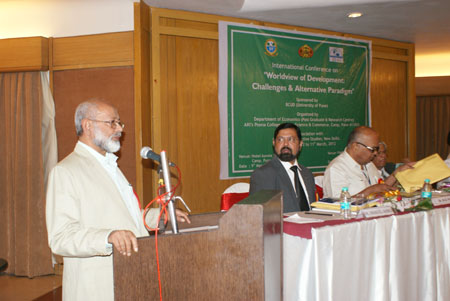
Speaker: Dr. M. Manzoor Alam, Chairman, Institute of Objective Studies, New Delhi
“There are divergent views on development that have their own perspectives and methodologies,” he said. He put it in the context of knowledge, power and political economy.
Islamic development, he said, laid emphasis on inclusiveness and falaah (wellbeing and welfare) of everyone irrespective of race, religion or region.
Dr Alam and explained that the IOS vision wanted the experience of the elder generation to be transferred to the younger generation, who would, with their energy, carry the mission forward.
“IOS addresses the nation, the society and the government of the day. I would like to invite all of you to Delhi to participate in our Silver Jubilee Finale,” he concluded.
Dr Naseem M. Shaikh proposed a vote of thanks.
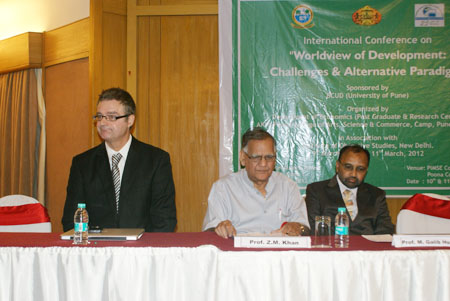
Technical Session-I
L-R: Mr. Timothy Wallis from Australia; Prof. Z. M. Khan, Secretary General, IOS, New Delhi, Chairman of the Session; 1. Prof. M. Galib Hussain, Emeritus Professor and Rector, Islamiah College, Vaniyambadi
The theme for this session, chaired by Prof. ZM Khan, was “Tawhidic Development: Cultural Intervention Strategy.”
Dr M. Ghalib Hussain, Professor Emeritus and Rector, Islamiah College, Vaniyambadi, delivered a talk on tawhidic paradigm of development that was centred on Islamic precepts.
A panel discussion on “Good Governance and Civil Response” followed. This session was chaired by Prof. Abdul Wahab, Chairman of Deptt. of Economics, Aligarh Muslim University (AMU).
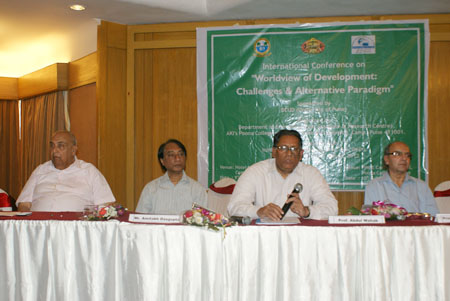
Panel Discussion
L-R: Mr. Dev Chopra, Advocate, Supreme Court of India; Mr. Amitabh Dasgupta, Journalist, Sakaal Times, Pune; Prof. Abdul Wahab, Chairman, Dept of Economics, AMU, Aligarh (Chairman of the session); Prof N.M. Vechalekar, Associate Dean INSEARCH, Pune
In his introductory remarks, Prof. Abdul Wahab said that good governance was known by its effects like inclusive growth, sustainability, higher standard of living and overall progress of the country.
Government’s civil responsibilities within such a scenario included involving citizens in the country’s vital affairs, promoting harmony between classes and castes, focusing on development, support to underprevileged citizens, playing a “constructive role in a proactive spirit.
Dev Chopra, advocate Supreme Court of India, asked, “Does a district collector, secretary of government or the prime minister think that he is a servant of the people?”
Continuing in that vein, he said, government made policies that bureaucrats had to implement as servants. “Why it is that citizens, entitled to get clean drinking water, do not get it and, yet, bureaucrats failing to deliver it are not prosecuted?”, he asked again.
Protection given to bureaucrats had made them autocratic, he observed. They enjoyed a certain level of protection even if they did not perform. One could not resort to use of force because that would lead to anarchy.
The society must find ways to make bureaucrats accountable. That would be the society’s contribution to good governance, he concluded.
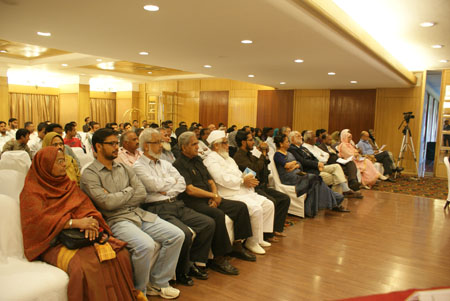
A view of audience
Amitabh Dasgupta, editor Sakaal Times, said India’s Constitution, one of the best among Constitutions, had somehow not helped in establishing good governance. One reason could be that we did not have adequate electoral reforms.
The forebidding cost of fighting and winning elections had made it impossible for honest politicians to come to power and straighten the system.
A gram panchayat poll costs a candidate Rs. 10-20 lakh, a municipal election Rs. 50 lakh and an assembly election Rs 5 crore. Naturally, a candidate putting in so much of money in elections would like to recover it by hook or crook.
A primary school takes Rs 3 lakh to build, but much of the money is syphoned off and the construction is overpriced by as much as 180 percent, Mr Dasgupta said.
Elected representatives of the people indulged in bribery, one of the reasons being that the voter did not have the right to recall. “There is no ‘No’ option for the voter in the EVM”, he said. Also, subservient police officers made it possible for politicians to get away with bad governance.
Recognising the limitations of the media, he concluded by saying “media is not the judge or the jury, police, or enforcement agency.”
Dr K G Pathan in his address on “Moral Values and Development” elaborated on the significance of moral values in good governance.
In an intervention the IOS chairman, Dr Mohammad Manzoor Alam, said the media usually did not give adequate coverage of issues related to Muslims. Besides, terrorist acts were unthinkingly ascribed to Muslims without ground.
He said young Muslims were indiscriminately rounded up and the community was being targeted. The media, instead of examining issues on merit seemed to believe the worst charges against Muslims and tom-tom them. That had led to great suffering.
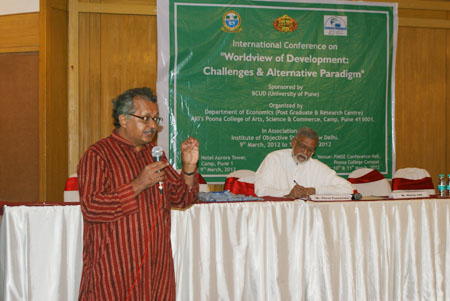
Technical Session-II
Mr. Phiroz Poonawala, Industrialist, Pune (Chairman of the session, sitting on the dais); Mr. Neeraj Jain, Environmentalist (speaker)
In this session environment activist Neeraj Jain gave a lecture on the crisis of global warning pleading for immediate reduction in greenhouse gases emissions.
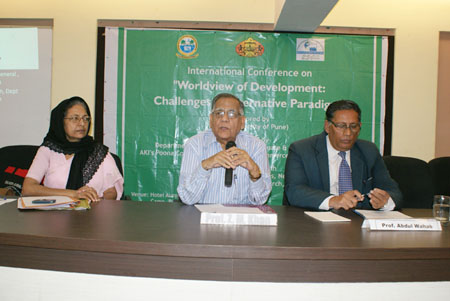
Day-II
Technical Session-III
L-R: Dr. Malika B. Mistry, Demographer, Social Activist and Community Worker; Prof. Z. M. Khan, Secretary General, IOS, New Delhi, (Chairman of the Session); Prof. Abdul Wahab, Chairman, Dept of Economics, A.M.U, Aligarh
The theme for this session was “Market and State” and the key speaker was Prof. Abdul Wahab. The session was chaired by Prof. Z.M. Khan.
In the third technical session, Prof. Abdul Wahab, Chairman, Department of Economics, AMU, emphasized that roles of market and state were not competitive but complementary. “Unless government is a good regulator, the benefits of globalisation cannot reach the masses”, he asserted.
There were eight parallel technical sessions, which almost 50 thought-provoking papers were presented by participants from all over the country and abroad.
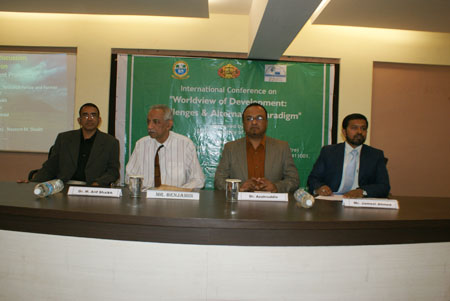
Panel Discussion-II
L-R: Dr. M. Arif Shaikh; Prof. Benjamin (Chairman of the session); Dr. Azahruddin, BS Baba Sahib Ambedkar University, Ahmed Nagar; Mr. Jameel Ahmed, Bangalore
Another panel discussion was on environment protection. It was chaired by Dr. Benjamin from Gokhale Institute of Politics and Economics. Dr. Arif Shaikh, Dr. Azharuddin and Jameel Ahmed participated in the discussion. All of them emphasised the need for protection of environment and suggested measures to achieve the goals.
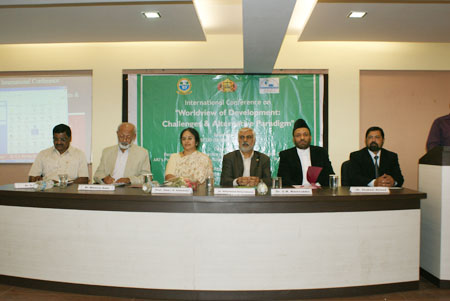
Day-III
Valedictory Session
L-R: Mr. GL Bhong Faculty of Mental Moral and social scineces; Dr. M. Manzoor Alam, Chairman, IOS, New Delhi; Prof. (Smt.) S. Indumati, Vice-Chancellor, Davangere University, Shivangotri, Davangere, & Vice-President, Indian Economic Association; Dr. Mohammad Hossein Karim, Counsellor, Science, Technology & Education, India & Sub Continent, Embassy of the Islamic Republic of Iran, New Delhi; Dr. G. M. Nazeruddin, Principal, Poona College, Pune; Dr. Shakeel Ahmed, Head Dept. of Economics & Vice –Principal, Poona College, Pune
In the valedictory session, the Vice Chancellor of Devengere University, Prof. S. Indumati stated that at the world level disparities were increasing between rich and poor countries. “The world is moving towards oligopoly. Developed countries constitute 15 % of world population but people there cosume 80 % of the world’s resources today. The WTO is the new name of ITO (International Trade Organisation) which was opposed in 1940’s. Within India too, the same is happening. In absolute numbers, the highest number of illiterate people live in India. Maternal mortality rate is also very high,” she observed.
His Excellency, Dr. Mohammed Hasan Karim, Advisor, Education, Science and Technology, India and Subcontinent. Embassy of Iran, gave thoughtful insights on the issues of development. He suggested that developing countries should pay each other in local currencies for international trading to save on foreign exchange. Developed countries always benefitted from developing countries by exploiting them. In future, there would be wars a over the precious resource of water. Therefore, there was a definite need for re-thinking on development.
Dr. Mohammad Manzoor Alam, Chairman, Institute of Objective Studies, stated that now the time had come for developing an alternative paradigm of development within a tawhidic framework.
A number of prominent personalities were given IOS awards for excellence in their profession and contribution to community development.
The awardees were:
- Prof. Dr. Mohammed Galib Hussain
Emeritus Professor (UGC) and Rector, Islamiah College (AUTONOMOUS),Vaniyambadi.
- Dr. Sadarul Hasan, Mumbai
Renowned Scholar, Arabic Language
- Mr. Munawar Pheerbhoy, Pune
Educationist and Community worker
- Mr. Zubair Shaikh, Pune
Architect and community worker
- Ms. Ashraf Mulla, Pune
Female Educationist and Community worker
- Dr. Phiroz Poonawala, Pune
Industrialist, Expert on Interest-free Finance and Community Worker
- Mr. Neeraj Jain, Pune
Environmentalist and Social Activist
- Dr. M. Arif Shaikh, Ahmednagar
Environmentalist and Academician
- Ms. Moosa Farin, Pune
Outstanding Student
- Mr. Sharif Ibrahim Kutty
Outstanding Bravery
- Prof. Shakeel Ahmed
Scholar, Academician and Industrial Economist
- Prof. Moinuddin Khan
Scholar in the Field of Arabic Language.
- Dr. Malika B. Mistry,
Demographer, Social Activist and Community Worker
- Mr. S.P. Shukla, IAS (Retd.)
Former Finance & Commerce Secretary, Govt. of India
- Prof. Abdul Wahab
Head, Dept. of Economics, Aligarh Muslim University, Aligarh
- Mr. M. A. Siraj
Renowned Journalist
Dr. Nazeruddin, the Principal, welcomed the guests, Dr. Shakeel Ahmed, the Vice-Principal and Head, Department of Economics, proposed a vote of thanks and Dr. M.B. Mistry coordinated the conference.
The following resolutions were adopted at the end of the seminar:
It is a matter of satisfaction and encouragement that the three-day international conference on “Worldview of Development: Challenges and Alternative Paradigm” is successfully conducted from March 9-11, 2012 as a part of IOS Silver Jubilee Celebrations of the Institute of Objective Studies (IOS), New Delhi in collaboration with AKI’s Poona College of Arts, Science and Commerce, Pune.
The concluding session of the conference adopted the following resolutions in the light of deliberations of the conference.
- It is a matter of appreciation that the conference has registered impressive presence of youth and women and it forms the basis of taking up relevant questions, particularly in areas concerning these segments.
- There is an urgent need to work out plans and programmes for involving IOS and the relevant sectors in and around Pune to work, particularly in sectors concerning marginalised sections of our society.
- It is urgently needed to work out and disseminate Islamic worldview based on tawhidic paradigm. The IOS and IIIT may provide necessary assistance in working together.
- Special efforts should be initiated to have more viable communication between the IOS and relevant organisations in Pune. The BCUD, University of Pune, may take the lead in formulating the whole scheme.
- The IOS should specifically direct its chapters in South India (Chennai and Calicut) to coordinate their activities Poona College of Arts, Science and Commerce, and carry out programmes specifically designed for marginalised sections of the society.
|